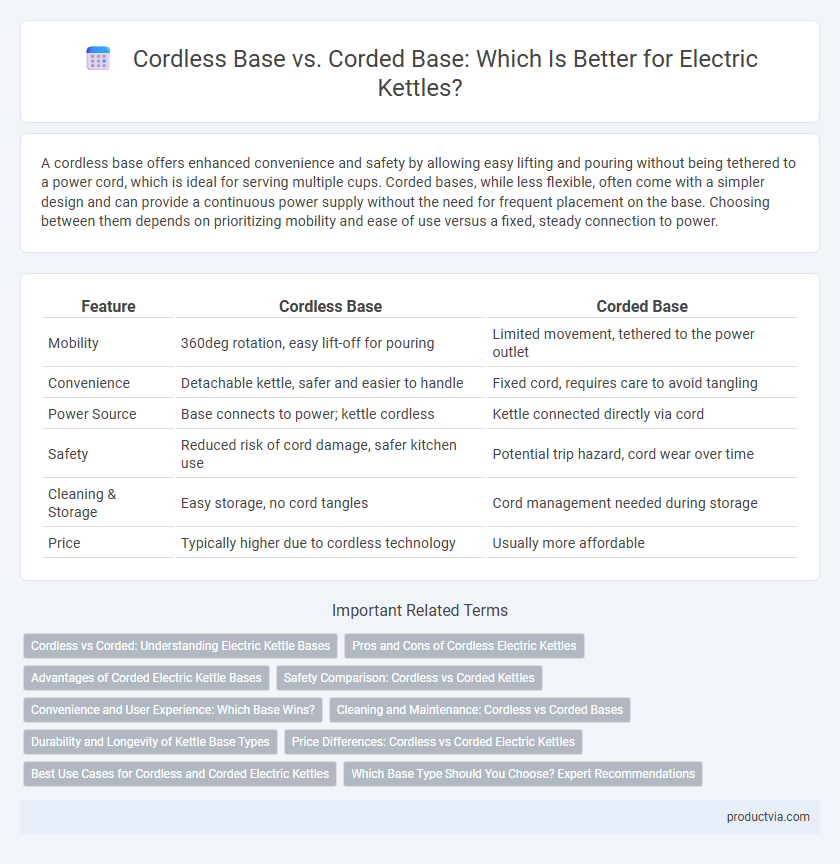A cordless base offers enhanced convenience and safety by allowing easy lifting and pouring without being tethered to a power cord, which is ideal for serving multiple cups. Corded bases, while less flexible, often come with a simpler design and can provide a continuous power supply without the need for frequent placement on the base. Choosing between them depends on prioritizing mobility and ease of use versus a fixed, steady connection to power.
Table of Comparison
| Feature | Cordless Base | Corded Base |
|---|---|---|
| Mobility | 360deg rotation, easy lift-off for pouring | Limited movement, tethered to the power outlet |
| Convenience | Detachable kettle, safer and easier to handle | Fixed cord, requires care to avoid tangling |
| Power Source | Base connects to power; kettle cordless | Kettle connected directly via cord |
| Safety | Reduced risk of cord damage, safer kitchen use | Potential trip hazard, cord wear over time |
| Cleaning & Storage | Easy storage, no cord tangles | Cord management needed during storage |
| Price | Typically higher due to cordless technology | Usually more affordable |
Cordless vs Corded: Understanding Electric Kettle Bases
Cordless electric kettles offer a 360-degree swivel base that enhances convenience by allowing easy lifting and placement without the restriction of a cord. Corded base kettles connect directly to the power source, which can limit mobility but often result in a more stable and sometimes lower-priced design. Choosing between cordless and corded bases depends on user preferences for flexibility, safety, and kitchen space optimization.
Pros and Cons of Cordless Electric Kettles
Cordless electric kettles offer the advantage of 360-degree rotation on their base, allowing easy lifting and placing without worrying about cord direction, enhancing convenience and safety. They provide portability and flexibility, enabling users to move the kettle freely for serving or filling, but they rely on a charging base that may limit placement options. On the downside, cordless models sometimes have a higher price point, and the detachable base can accumulate wear and tear over time, potentially affecting durability.
Advantages of Corded Electric Kettle Bases
Corded electric kettle bases offer consistent power supply without the need for battery charging or wireless connectivity, ensuring uninterrupted heating performance. They typically provide better stability and a lower risk of misalignment compared to cordless models, enhancing safety during use. These bases often feature integrated controls and indicators directly on the unit, allowing more precise temperature settings and real-time status monitoring.
Safety Comparison: Cordless vs Corded Kettles
Cordless electric kettles offer enhanced safety by eliminating the risk of tripping over or tangling cords, reducing potential accidents in busy kitchens. Corded kettles keep the power source tethered, which can increase the chance of spills or burns if the cord is pulled accidentally. Safety certifications like UL and CE are common for both types, but the cordless design inherently minimizes hazards related to electrical cords and provides greater stability when lifting or pouring.
Convenience and User Experience: Which Base Wins?
A cordless base offers unparalleled convenience by allowing easy lifting and pouring without being tethered to a power outlet, enhancing mobility and user safety during use. Corded bases, while often more stable and sometimes featuring integrated power switches, limit movement and can be cumbersome when handling hot liquids. For optimal user experience, cordless bases typically win due to their flexibility, ease of cleaning, and ability to serve multiple users from different seating positions without rearranging cords.
Cleaning and Maintenance: Cordless vs Corded Bases
Cordless electric kettle bases offer easier cleaning and maintenance since the kettle detaches completely, preventing water damage to the electrical components and allowing thorough cleaning of both base and kettle separately. Corded bases remain attached, making it harder to clean around the base and increasing the risk of water exposure to the power connection, leading to potential corrosion or electrical faults. Choosing a cordless base enhances durability and hygiene by simplifying routine cleaning and reducing maintenance requirements.
Durability and Longevity of Kettle Base Types
Cordless electric kettle bases typically offer enhanced durability due to fewer mechanical wear points and reduced cable stress, resulting in longer lifespan compared to corded bases. Corded kettle bases may experience fraying or connector damage over time, which can compromise safety and functionality. Investing in a cordless base reduces maintenance needs and ensures consistent electrical contact, improving the kettle's overall longevity.
Price Differences: Cordless vs Corded Electric Kettles
Cordless electric kettles typically have a higher price point compared to corded models due to their enhanced convenience and portability features. Corded kettles, with a fixed power connection, are generally more affordable but less flexible in placement and use. The price difference often reflects design complexity and user convenience rather than differences in heating performance.
Best Use Cases for Cordless and Corded Electric Kettles
Cordless electric kettles offer maximum convenience and safety for quick pouring and mobility in kitchens or offices without nearby power outlets. Corded electric kettles provide continuous power during use, ideal for heavy-duty boiling tasks or commercial settings where extended operation is required. Choosing between cordless and corded bases depends on portability needs and frequency of use, with cordless favored for household versatility and corded suited for professional efficiency.
Which Base Type Should You Choose? Expert Recommendations
Cordless electric kettles offer enhanced convenience and safety by allowing easy pouring without being tethered to a power outlet, suitable for frequent use and portability. Corded base kettles typically provide a more stable connection and can be less expensive, ideal for stationary kitchen setups where mobility is less critical. Experts recommend choosing a cordless base for versatility and ease of use, while corded bases are preferred for consistent power supply and budget-friendly options.
Cordless base vs corded base for electric kettle Infographic

 productvia.com
productvia.com